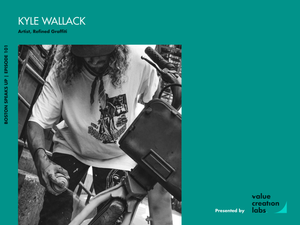
Is cryptocurrency the solution to providing a more affordable Internet?
AirFox thinks so, which is why the Boston startup is launching its own cryptocurrency as a way to help low-income individuals redeem mobile data for their smartphones, as well as buy digital services and physicals goods. But the company isn't stopping there: It also plans to use the cryptocurrency as a way to give out microloans, especially to those who don't have easy access to financial services and those who don't have banks at all.
Cryptocurrency, which a form of virtual currency that uses cryptography to secure transactions, became popular with the advent of Bitcoin nine years ago. Popular cryptocurrencies like Bitcoin and Ethereum are powered by blockchain, a digital ledger managed by a decentralized network of computers as a way to reduce tampering.
To kick off AirToken, its new cryptocurrency, the company aims to raise up to $15 million on Sept. 19 in an Initial Coin Offering, which is a new form of crowdfunding done through cryptocurrency. The Techstars Boston alumnus is raising the money through AirToken, which is based on the Ethereum blockchain, because it believes cryptocurrency is the best way to fulfill its goal of giving people more economic mobility.
"It's really sad that the more poor you are, the more you have to pay for access. We want to break that."
With the company's latest move, AirFox is operating at the cross-section of two trends: startups opting to raise capital through cryptocurrencies instead of more traditional means, and the use of apps to provide affordable Internet to low-income individuals. According to Pitchbook data provided to Fortune, blockchain startups have raised $1.3 billion through Initial Coin Offerings in the first six months of this year while venture capital firms have only provided those startups with $358 million in the same period.
On the affordable Internet side, AirFox is competing with Boston startup Jana, which also aims to make smartphone data more affordable in emerging markets where mobile plans can be prohibitively expensive. But what separates the two is that Jana, which has raised roughly $93 million from investors since its founding in 2009, is purely focused on advertising while AirFox plans to expand into microloans.
After launching last year with a $1.1 million seed round, AirFox found some early traction in helping make mobile Internet more affordable for low-income people on prepaid smartphone plans. Its first product, a "sponsored data platform" called AirFox Wireless, has already served more than 2 million customers across three prepaid wireless carriers, which helped the company bring in $600,000 in revenue in its first 10 months.
But because AirFox has to sell AirFox Wireless as a service to the wireless carriers themselves, the company has been looking for ways to reach consumers more directly, Victor Santos, co-founder and CEO at AirFox, told BostInno. So when the company started looking into the blockchain, the digital ledger technology that powers cryptocurrencies like Bitcoin, it eventually decided to make its own cryptocurrency to power a consumer offering.
Through its new AirToken cryptocurrency, the company aims to offer tokens to prepaid smartphone users through advertising and microloans. It plans to do this with two new apps, an ad-blocking Internet browser that serves AirFox's own ads and AirFox Recharge, which lets users fill out surveys, view ads and complete other actions to receive tokens.
Both apps will enable users to apply for microloans in the AirToken cryptocurrency, which people can then use to pay for airtime and, eventually, digital services and physical goods. Santos said the terms and conditions of a microloan will be set through its own credit ranking system, which it will determine by analyzing a user's browsing history, device data, mobile behavior and payments. In the company's white paper for its Initial Coin Offering, it said that the microloan's annual percentage rate will range from 5-40 percent — which Santos said is much lower than what low-income people typically have access to.
"It's really sad that the more poor you are, the more you have to pay for access," he said. "We want to break that."
While AirFox is targeting low-income individuals, it's more specifically looking to help prepaid smartphone users who are "underbanked" or "unbanked," meaning those who lack easy access to mainstream financial services or have no bank accounts at all. As part of its first expansion outside the United States, AirFox plans to roll out its service to Mexico and Brazil, Santos' home country where over 40 percent of the population is unbanked.
For the company's Initial Coin Offering, it plans to use the $15 million to purchase mobile data and airtime in bulk, develop its microloan program and expand to emerging markets. In the company's white paper, AirFox said if it reaches $15 million in the August 29 ICO, it will look to raise an additional $6 million. That would allow the company to mint a total of 150 billion in AirTokens as part of the token generation event.
Because AirToken will serve as a utility token rather than a utility, Santos said AirFox will not be subject to new rules from the U.S. Securities Exchange Commission.
The company was founded by Santos and Sara Choi in early 2016 after the two met each other at Google a few years ago. Choi has since left the company last month to attend Harvard Business School and is now serving in an advisory capacity, Santos said.
Editor's note: This article has been updated to reflect that AirFox's Initial Coin Offering has been moved from the end of the month to Sept. 19.








